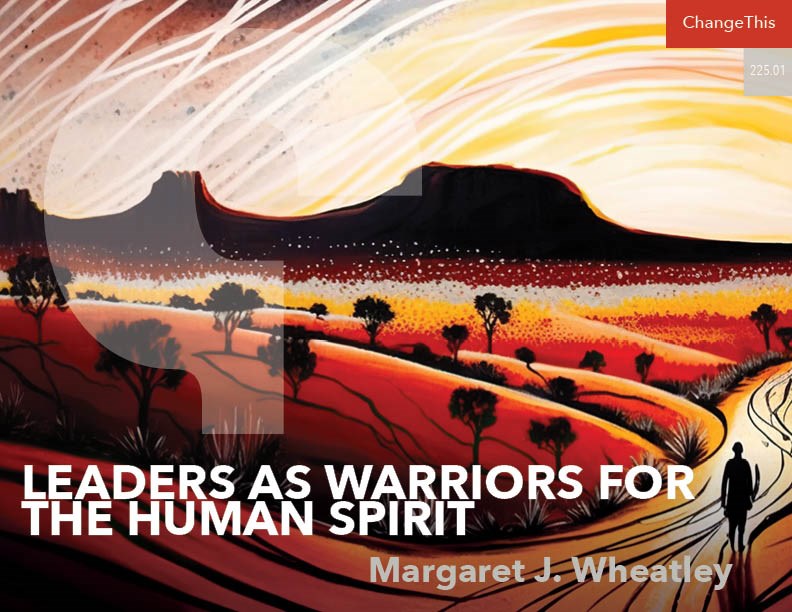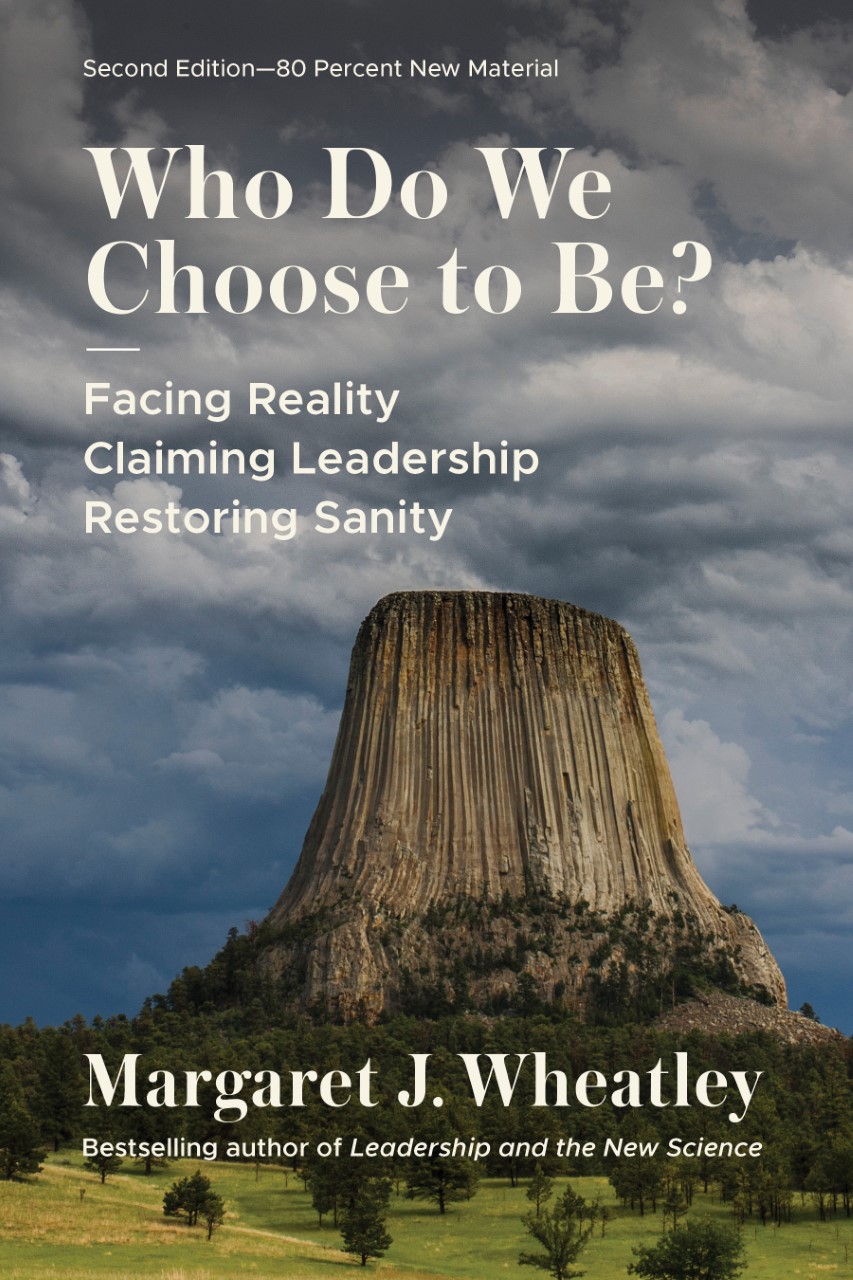Leaders as Warriors for the Human Spirit
June 07, 2023
We need leaders who put service over self, stand steadfast in crises and failures, and who display unshakable faith that people can be generous, creative, and kind.
Let me begin with the story of how this second edition of my book first published in 2017 insisted on becoming a brand new book.
For many decades, everything I’ve written or taught or spoken about has focused on who we need to be: We need new eyes in order to see new possibilities. We need to see clearly so that we can act wisely. We need to be able to restore goodness wherever we can. We need to embody the best human qualities of generosity, kindness, and creativity. We need to create community and healthy relationships as the fundamental means to solve problems.
Over these decades I’ve worked with a great diversity of people in multiple roles and in different cultures, all of whom want to make a meaningful contribution. But what is meaningful depends on what the world needs, not what we self-define as meaningful. The world defines meaning for us if we are willing to tune into what’s happening and face reality with an open heart and mind.
At this time, if we’re truly to contribute to our families, our communities, our causes, our organizations—the things we care about—we need to meet the world on its own terms, we need to be able to face reality in order to define a path of meaningful contribution.
Why a second edition became a brand new book
In 2017, I wrote Who Do We Choose To Be to bring the world into focus so that we could see clearly what was going on. Using several different lenses, I asked us to face reality, to claim leadership and to restore sanity.
I’m still asking these same questions, but the world has changed so intensely and dramatically in the past six years that I had to write a new book. I’ve used the same design with its spaciousness and beauty, and the same focus, but with new lenses and new content.
What is required of us to make a meaningful contribution now? Now, this time of extreme intensification, of increased aggression and war, of increased interpersonal conflicts and hatred, of increased illnesses both physical and mental, of increased injustices, of increased poverty, of increased environmental and climate catastrophes. These negative and powerful dynamics have intensified at an exponential rate.
We cannot change this world or reverse these dynamics set in motion by life’s fundamental processes and by human greed, indifference, and denial. We cannot change this world, but we can respond to it. With clarity and wisdom, we can bravely and willingly face reality, claim a leadership role for ourselves, and restore sanity in whatever we do, wherever we are.
As President Teddy Roosevelt encourages us: “Do what you can, where you are, with what you have.” To which I add: with the people there with you.
We need to see clearly to act wisely
The complexity of the world cannot be understood by focusing on one problem, one dynamic or one issue, yet generally this is our normal way of responding. We get aroused by an issue or cause. We try to understand it and then work very hard to create policies and conditions that alleviate or mitigate this issue. But any one problem or issue is the consequence of many intertwined and entangled dynamics. Every time we’ve attempted solutions focused only on that issue we have failed.
To see the world clearly and to create wise actions, we need to understand the complexity of causes and conditions that manifest themselves in any one issue. To bring this harsh world into clear focus, we need to use several different lenses.
In this second edition, I’ve used even more lenses, including well-documented histories of the decline of complex civilizations, modern physics, the new science of living systems, Indigenous science of interconnectedness and partnering with life, neurobiology, and the timeless teachings from many spiritual traditions.
I want us to see clearly so that our actions are both wise and useful.
Choosing to be a Warrior for the Human Spirit
The title of this book asks a question that I have used with leaders for many years: Who do you choose to be? How do you intend to use your power and influence in service to this time?
Warriorship is an historic role. In every tradition, Warriors appear when something is at risk of being lost, whether it’s land, power, or privilege. Warriors for the Human Spirit know how much is being destroyed by denial or outright repression of the qualities inherent in all humans. They understand the cataclysmic costs of playing Masters of the Universe with life, ignoring the fundamental laws by which life organizes, sustains, and develops itself. As an historic role, warriors arise from those few people who, as historian Sir John Glubb described, “raise the banner of duty and service against the flood of depravity and despair.”
Restoring sanity through our leadership
There is an undeniable need for leaders to create the conditions for people to remember who they can be when free of fear, engaged in creative work that matters to them. Meaninglessness is a dark shroud that has smothered people’s aspirations and darkened the memory of what it feels like to be engaged with colleagues in purposeful, challenging work.
We need to recall the quality of energy, inspiration, and creativity that we’ve experienced when engaged in responding to great challenges, in understanding complex problems, in making bold attempts that may or may not work but are satisfying in the attempt.
Sane leadership is the unshakable confidence that people can be generous, creative, and kind. The leader’s work is to create the conditions for those capacities to manifest in meaningful work.
I am not encouraging us to take up the role of sane leaders from idealism or optimism. Over several decades, I’ve worked with extraordinary leaders who created Islands of Sanity where good work still got done, and people enjoyed healthy relationships in the midst of chaotic conditions, fierce opposition, heartbreaking defeats, lack of support, isolation, loneliness, betrayal, and slander. I have been with them in circumstances that caused most other leaders to give up and walk away. Yet still, they kept going.
I describe three of these extraordinary leaders in this book: The Army Chief of Staff, General Gordon R. Sullivan, who prepared the military for the 21st century; the Catholic nuns who led the Leadership Council of Women Religious during a period of Vatican oppression; a foremost American educator who understood the power of story and narrative when her institution committed a serious error.
I know leadership is hard, challenging work that grows more demanding day-by-day. In my 50+ years of working with leaders, leadership has never been more difficult.
Yet I know it is still possible for leaders to use their power and influence, their insight and compassion, to lead people back to an understanding of who we are as human beings, to create the conditions for our basic human qualities of generosity, contribution, community and love to be evoked, no matter what. I know it is possible to experience grace and joy in the midst of tragedy and loss. I know it is possible to create Islands of Sanity in the midst of wildly disruptive seas. I know it is possible because I have worked with leaders over many years in places that knew chaos and breakdown long before this moment.
And I have studied enough history to know that such leaders always arise when they’re most needed. It’s just our turn to serve our time.
We need leaders who recognize the harm being done
to people and planet through the dominant practices that
control, ignore, abuse, and oppress the human spirit.
We need leaders who put service over self,
stand steadfast in crises and failures, and
who display unshakable faith that
people can be generous, creative, and kind.



